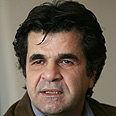
Panahi. Still free pending imposition of sentence
Photo: AFP
A Tehran appeals court has upheld a six-year jail sentence and 20-year filmmaking and travel ban against international award-winning Iranian director Jafar Panahi, his family told AFP.
The government-run newspaper Iran
confirmed the ruling in its Saturday edition, saying: "The charges he was sentenced for are acting against national security and propaganda against the regime."
The verdict, handed down around two weeks ago, has not yet been carried out, the family said.
No Rights
Marzieh Vafamehr sentenced to year in prison, 90 lashes for her role in film about limits imposed on artists in Islamic Republic
Panahi was convicted in December last year over a documentary he tried to make about the unrest that followed the disputed 2009 re-election of President Mahmoud Ahmadinejad.
The daily said that a six-year jail sentence against another Iranian who co-directed that film, Mohammad Rasoulof, 38, was reduced to one year in the same appeal.
Panahi, 51, has won a slew of foreign awards for his films. But many are banned in Iran where authorities are unhappy with his satirical portrayal of everyday life in the Islamic republic.
One of Panahi's latest productions was a documentary entitled "This is not a Film," depicting a day in his life as he waited to hear the verdict from the appeal. It was screened at the Cannes film festival in May.
Panahi's family said the filmmaker was still free pending the imposition of the jail sentence.
Panahi's lawyer, Farideh Ghairat, said: "We have no news. The verdict has not been confirmed to us."
Panahi's upheld sentence orders him to six years behind bars, plus a 20-year ban on directing or writing for movies, a 20-year ban on giving interviews, and a 20-year ban on travel except for the Hajj holy pilgrimage to Mecca or for medical treatment.
The appeals court affirmed an initial sentencing of Panahi handed down in December 2010, following his arrest in March that year which led to him being released in May 2010 on $200,000 bail.
Repression of domestic film production
Western politicians and filmmakers protested Panahi's conviction and called for the legal action to be dropped.
The European Union's foreign policy chief, Catherine Ashton, in January said punishment such as that meted out to Panahi was "not compatible with the human rights commitments that Iran herself has subscribed to in several international conventions."
Ahmadinejad's chief of staff, Esfandiar Rahim Mashaie said, also in January, that the government opposed Panahi's sentence. But that appeared to have no influence on the judges hearing the case.
Neither Panahi nor Rasoulof have been allowed to leave Iran to attend international film festivals.
In Cannes this year, where both had movies screened, Rasoulof's wife picked up her husband's best-director prize in the Un Certain Regard section of the festival.
Repression of Iran's domestic film production has intensified since Ahmadinejad's 2009 re-election.
More than a dozen directors or actors have been arrested and sometimes severely sentenced since the middle of this year for "propaganda" against the regime, including several documentary makers accused of giving a "black image" of Iran.
Early this month, Iranian actress Marzieh Vafamehr was sentenced to a year in jail and 90 lashes for her role in Australian-produced film "My Tehran for Sale," about the limits imposed on artists in the Islamic republic.
- Follow Ynetnews on Facebook















